PsychNewsDaily Publishers
100 Summit Drive
Burlington, MA, 01803
Telephone: (320) 349-2484
PsychNewsDaily Publishers
100 Summit Drive
Burlington, MA, 01803
Telephone: (320) 349-2484
Caring for a cat involves time, money, and energy. Utilizing smart hacks can streamline routines, reduce costs, and enhance the well-being of both cat and owner.

Caring for a cat is incredibly rewarding, but wow, it can eat up your time, cash, and energy fast. Between all the feeding, grooming, and daily routines, sometimes it feels like you’re always playing catch-up.
But honestly, picking up a few clever hacks can make living with your cat a lot smoother—and maybe even a little cheaper and less stressful.
With the right tricks, you can cut down on chores and prevent some of those annoying problems. You’ll probably find your home feels better for both you and your cat.
These little changes add up. You save money, stress less, and get more time for the fun parts of having a cat.

Vet bills can get out of hand, especially if your cat gets sick or has an accident. Pet insurance lets you plan ahead so you’re not slammed with the whole bill at once.
A lot of plans cover most treatment costs—usually 70–90% depending on what you choose. This makes it easier to say yes to the care your cat needs, without stressing about the price tag.
You can keep your current vet, which is a relief since changing clinics is a pain. Some plans even offer wellness add-ons for regular visits and routine care.
Before you sign up, it’s smart to compare policies. Check out the monthly premiums, deductibles, and what’s actually covered. That way, you find something that fits your budget and your cat’s needs.
Sure, pet insurance adds another bill, but it saves you from massive surprise expenses. It’s a trade-off, but having that safety net is a huge relief.

Buying cat food and litter in bulk usually means you pay less per pound. It also means fewer last-minute trips to the store.
Online shops and warehouse clubs often have deals on bigger bags, sometimes with free shipping. If you watch for sales, you can really stack up the savings.
Just store everything in airtight containers or bins to keep food fresh and litter dry. That way, you don’t end up with stale kibble or soggy litter.
With a good stash, you won’t panic when you’re running low. It’s a small thing, but not having to dash out for supplies is a real win.
If you’ve got the space, stocking up on essentials makes life with your cat a whole lot easier.

You don’t have to drop a ton of cash to keep your cat busy. Most homes are full of stuff that makes great toys.
An empty toilet paper roll? Instant chase toy. Cut a few holes in it or stuff it with paper for extra fun. Cats love batting it around.
Crumpled paper or a paper bag can work too. The sound and texture are usually irresistible, as long as you keep an eye on things.
Got old socks? Fill one with fabric scraps or crinkle paper, tie a knot, and you’ve got a DIY toy your cat can bat or carry.
String or ribbon is fun, but only if you’re there to supervise. Playing together keeps it safe and is a nice way to bond.
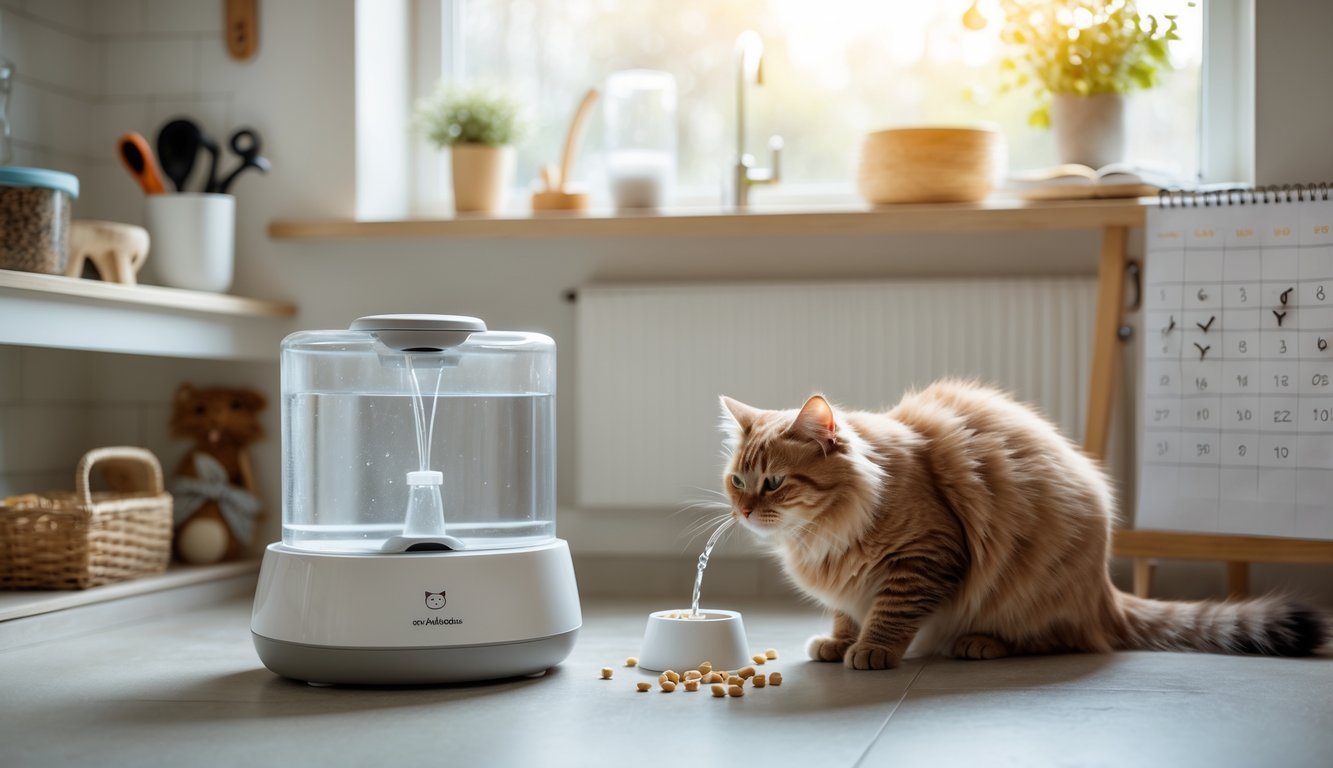
An automatic feeder lets you keep your cat on a schedule, even when you’re not home. You can set it to dispense food at certain times, so you’re not rushing back for mealtime.
It also helps with portion control, so your cat doesn’t overeat. You won’t have to guess how much food to leave out.
If your cat’s new to the feeder, give them time to get used to it. Put it near their usual eating spot and let them check it out.
Some feeders even come with apps for remote control. If your days are unpredictable, that’s a real lifesaver.
With the right setup, you save time and your cat gets fed on time.

Sprinkling a little baking soda in the litter box keeps things fresher. It actually neutralizes odors instead of just masking them.
Just add a thin layer to the bottom of the clean box before you pour in fresh litter. You can mix in a bit more if you need to.
Baking soda is cheap, scent-free, and won’t bother your cat’s nose. Unlike some sprays, it’s simple and safe.
Don’t forget to scoop daily and change the litter regularly. Baking soda helps, but it’s not magic on its own.
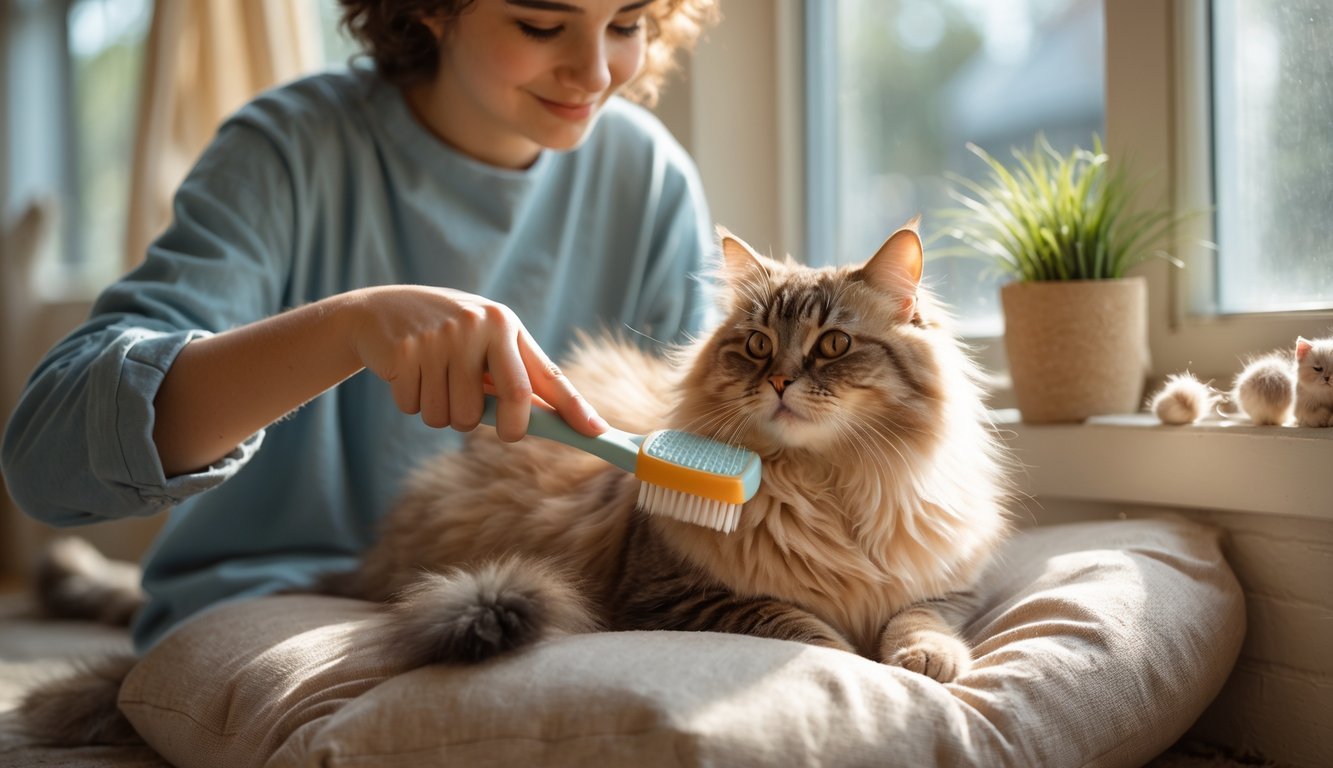
Brushing your cat every day keeps loose fur in check. Less fur on your furniture and clothes—and less in your cat’s stomach, too.
Regular brushing really cuts down on hairballs. Cats swallow a lot of fur when they groom, and that can cause tummy trouble.
Pick a brush that matches your cat’s coat. Short-haired cats do fine with a bristle brush or grooming mitt. Long-haired cats might need a slicker brush or wide-tooth comb.
Brushing is also a sweet way to bond. Most cats love the attention, especially if you start slow. Over time, it can become a relaxing routine for both of you.

When your cat’s nails get too long, they snag on everything—furniture, carpets, even you. Regular trims protect your stuff and make life comfier for your cat.
You don’t need to go super short. Just trim the sharp tips every couple of weeks. This simple habit can save you from expensive repairs.
If your cat’s fussy, try trimming one or two nails at a time. Treats after each session help your cat stay calm.
Use cat nail clippers or small human ones. Hold the paw gently, press the pad, and snip the clear tip—never the pink part.
Keeping up with trims protects your cat and your belongings. It’s easy, saves money, and lowers everyone’s stress.
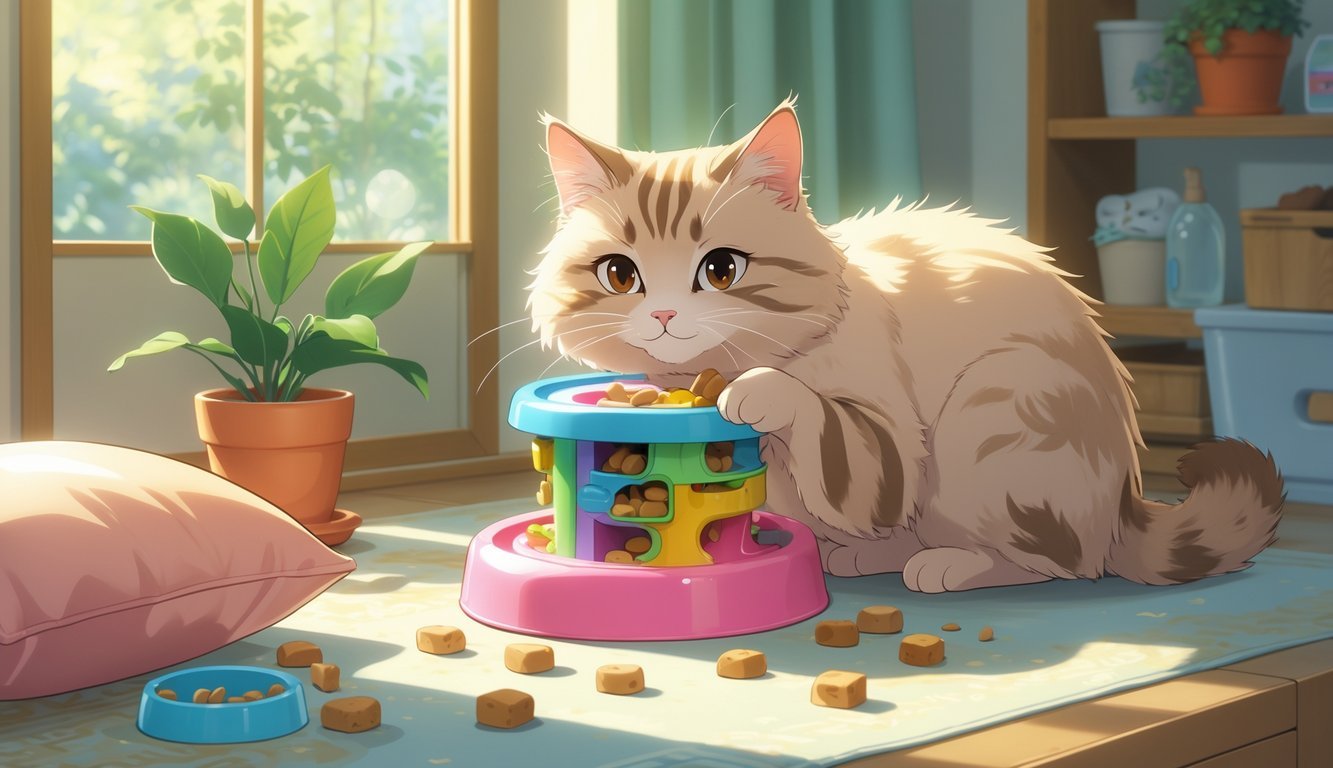
If your cat eats way too fast, a puzzle feeder can help. It makes them work for their food, slowing things down and helping prevent indigestion or overeating.
Puzzle feeders also give your cat a mental workout. Instead of just eating, they get to solve a little challenge, which keeps boredom away.
In homes with multiple cats, puzzle feeders can ease competition. Spreading out mealtime helps everyone eat more calmly.
You don’t have to spend big—many are affordable, or you can make your own with safe containers.
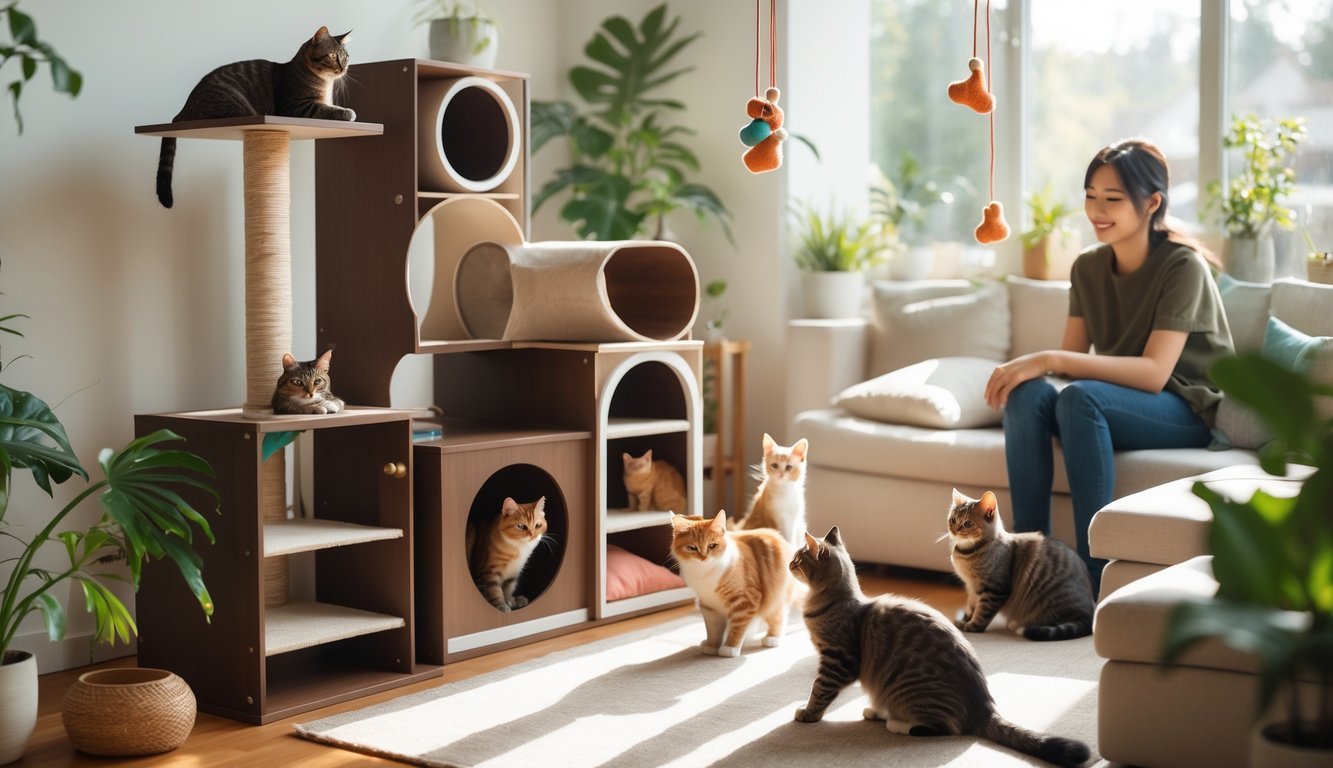
You can cut clutter and costs by picking cat furniture that does double duty. One piece that’s a scratcher, climber, and bed gives your cat options without crowding your place.
Multi-level cat trees or condos are great if you’ve got more than one cat. They offer spots to play, rest, and scratch—no fighting over territory.
Living in a small apartment? Space-saving designs are a lifesaver. Some cat towers are slim or fit in corners, and others can go right on the wall.
Look for sturdy materials so your furniture lasts. Spending a bit more upfront usually means you won’t have to replace things as soon.
Some cat furniture even blends in with your home. Modern styles use wood or neutral fabrics, so they work as décor too. It’s nice when your place looks good and your cat’s happy.

Joining a pet store loyalty program can save you money on the stuff you buy all the time. Stores like Petco and PetSmart give you points for every dollar, and you can trade those for discounts.
These programs often give you early access to coupons and sales. Planning your shopping around deals helps you keep your cat’s supplies stocked without overspending.
Some programs even toss in birthday treats for your pet or free samples. It’s a nice little bonus that makes cat care a bit more fun.
Signing up is usually quick and free—just your email or phone number, and you’re good to go.
If you shop online, you can link your account and earn points from home too.
Loyalty programs help you stretch your budget while still giving your cat what they need.
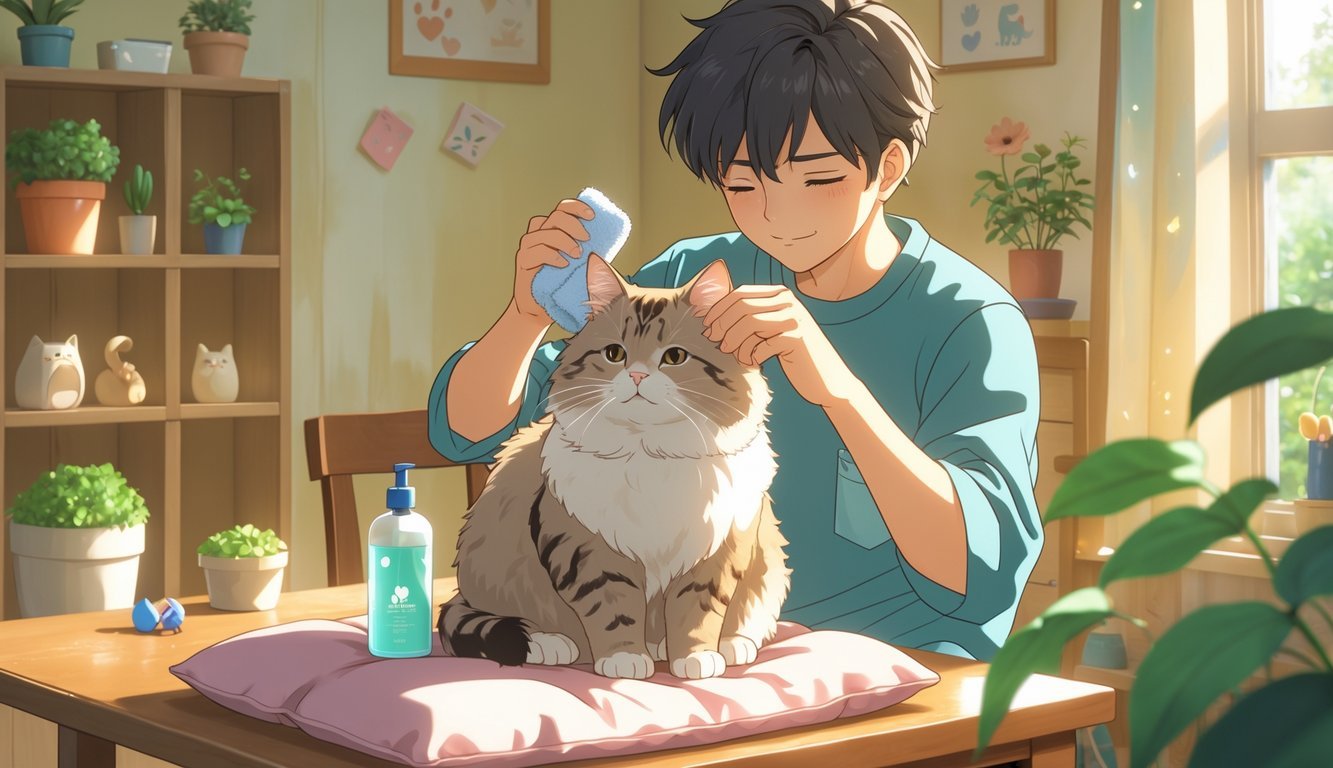
You don’t need fancy products to keep your cat’s ears clean. Honestly, a simple homemade mix does the trick for most cats.
Just mix equal parts warm water and plain vinegar. Vinegar breaks down debris, and the water keeps it gentle enough for those sensitive ears.
Make sure the mixture feels like room temperature before you use it. Nobody likes a cold surprise, least of all your cat.
Soak a cotton ball or soft pad with your solution. Gently wipe the outer part of your cat’s ear—don’t go digging inside the canal.
Skip the cotton swabs. They just push dirt deeper or, worse, hurt your cat’s ears.
If your cat’s ears look red, swollen, or you see discharge, don’t try to fix it at home. Call your vet instead.
Homemade solutions work best for routine care, not for infections or serious problems.
Cleaning your cat’s ears a couple of times a month helps keep things under control. With a little patience and a calm vibe, ear care can actually be quick and not too stressful for either of you.
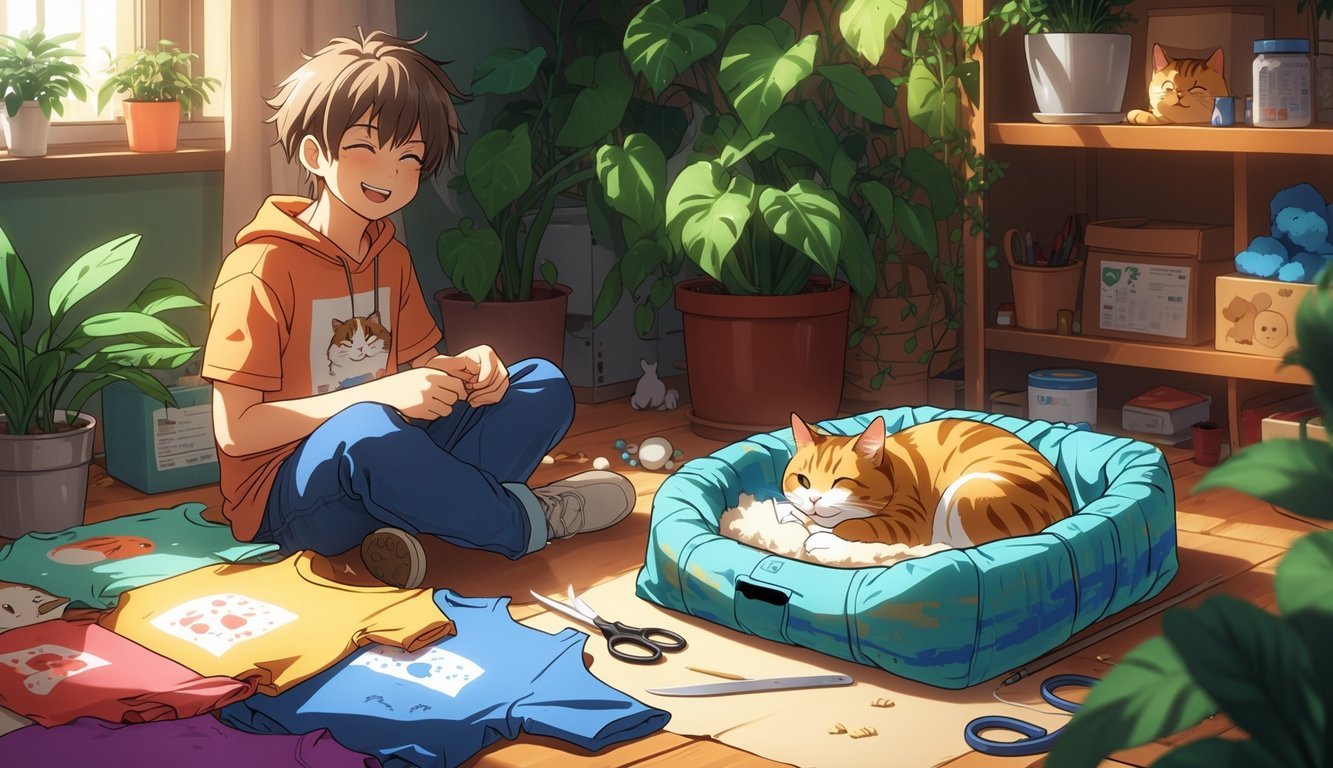
You don’t have to buy a fancy cat bed. Chances are, you already have everything you need at home.
An old t-shirt can become a cozy spot for your cat. The familiar scent of your clothes makes most cats feel safe and relaxed.
One easy way is to stretch a t-shirt over a piece of cardboard or foam board. This gives it some structure but still keeps things soft.
Put it in a quiet corner, and suddenly you’ve got a cat bed.
If you’re feeling crafty, make a small tent with a t-shirt, two wire hangers, and a piece of cardboard. The hangers make the frame, the cardboard is the base, and the shirt slips right over the top.
A lot of cats love hiding out in these little tents.
Or just stuff a t-shirt with a pillow or folded blanket. Tie off the ends, and you’ve got a comfy bed in a minute or two.
It’s quick, free, and uses stuff you already own.
Toss in a favorite toy or a sprinkle of catnip if you want to make the bed extra appealing. Your cat might claim it right away, especially if you put it where they usually nap.

Little tweaks in how you handle your cat’s needs can save you time, cut costs, and make your daily routine less of a hassle. These hacks also help you create a calmer space for your cat, and honestly, life feels smoother for both of you.
Smart shortcuts in your routine mean you spend less time on chores and more time actually enjoying your cat.
For example, line the litter box with a disposable liner or use a scoop with a built-in sifter. Cleaning suddenly gets a lot faster.
You can save money by reusing things you already have. A cardboard box or paper bag easily becomes a toy, and your cat gets enrichment without you spending more.
Even a simple DIY scratching post wrapped in sisal rope can last longer than a lot of store-bought ones.
Feeding gets easier with small changes, too. Pre-portion dry food into containers to keep meals consistent and prevent overeating.
If you’re out of the house a lot, an automatic feeder keeps your cat on schedule.
You’ll notice that these small changes reduce your effort but still give your cat what they need. Over time, those little savings in time and money really add up.
Cats love routine and comfort, so hacks that create stability can lower their stress. A quiet feeding area, a clean litter box, and a cozy resting spot help them feel secure.
Your stress drops when daily care feels simpler. Washable blankets on furniture make cleaning up fur a breeze.
Keep a small grooming kit handy and you’ll tackle shedding before it takes over the house.
You can prevent some common problems with a few easy tricks. Put double-sided tape on furniture to stop scratching, and keep a scratching post nearby as a positive outlet.
When your cat feels calm and you spend less time cleaning up, home just feels more relaxed.
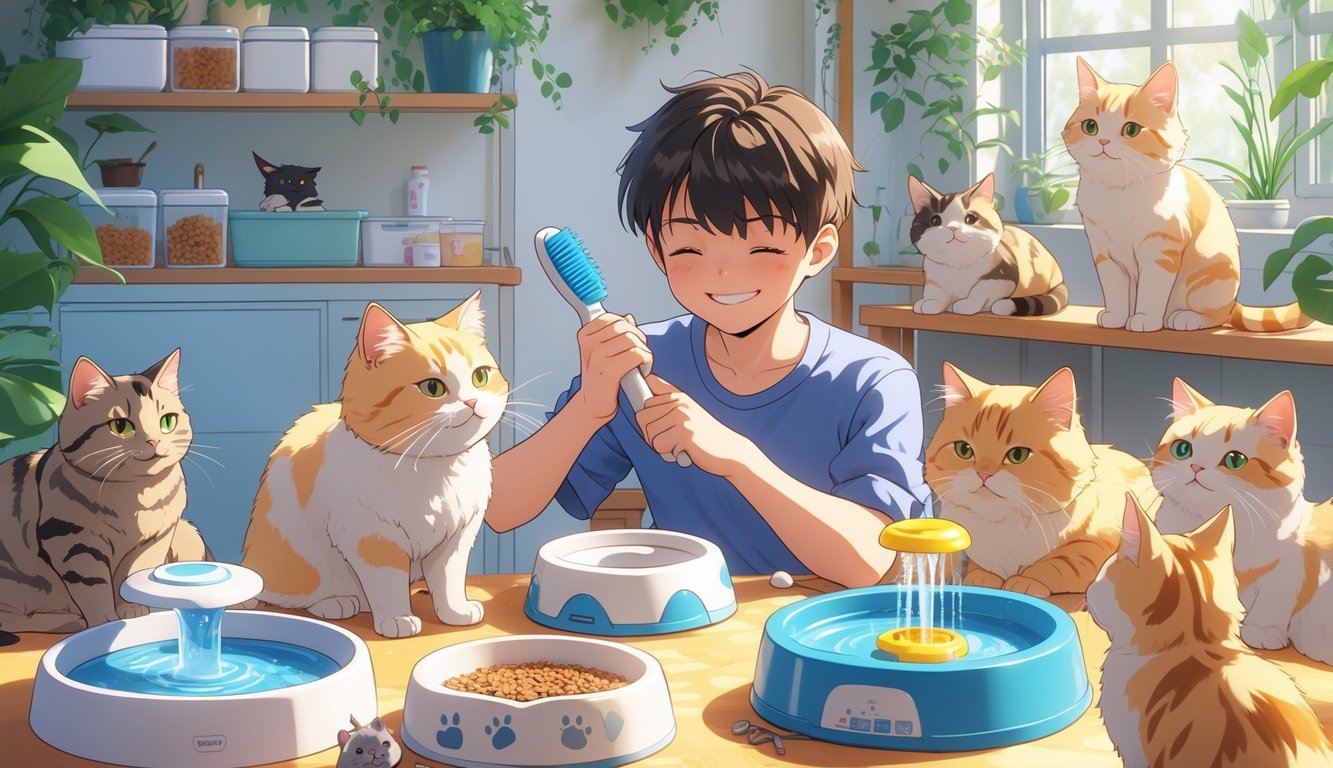
Shortcuts can make cat care easier, but using them the wrong way can create problems. Pay attention to safety and your cat’s unique quirks to avoid stress and keep your pet healthy.
Some hacks save you time, but they might have hidden risks. For example, if you use household cleaners near food bowls or litter boxes, your cat could get exposed to harmful chemicals.
Always double-check that materials are non-toxic and safe for pets.
DIY toys need some extra thought. Loose strings, rubber bands, or small parts can get swallowed and cause choking or stomach problems.
If you make toys at home, stick to sturdy fabrics or big items your cat can’t swallow.
Be careful with grooming tools that aren’t made for cats. Human brushes or scissors might pull fur or nick skin.
Choose products designed for pets, and test them slowly.
It helps to keep a simple safety checklist handy:
A little caution keeps your hacks helpful instead of risky.
Honestly, cats can be a bit unpredictable with new ideas. What works for one might totally stress out another. Some cats go wild for puzzle feeders, but others just get annoyed and walk away hungry.
Before you make anything a regular part of your routine, just see how your cat reacts.
If your cat seems shy, it’s probably best to skip hacks that shake things up too fast, like moving the litter box or swapping out food bowls. Small, gradual changes usually make things less stressful.
Active cats? They might love climbing hacks—think shelves or scratching posts. Meanwhile, a calmer cat just wants a comfy spot to nap.
Matching your hacks to your cat’s energy makes a big difference.
Try jotting down your cat’s reactions in a quick table:
| Hack | Cat’s Reaction | Keep/Adjust/Remove |
|---|---|---|
| Puzzle feeder | Ignored | Adjust |
| Cardboard box bed | Loved | Keep |
| Homemade toy with string | Tried to chew string | Remove |
Paying attention and tweaking things helps your cat stay happy, instead of frustrated.